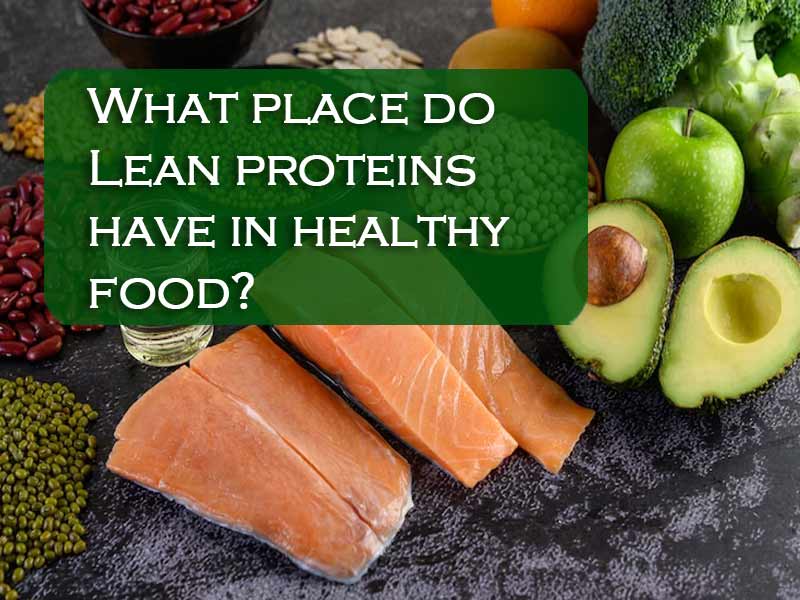Lean Proteins are an essential component of a healthy diet. They are the building blocks of our body and play a critical role in the growth and repair of tissues. However, not all proteins are created equal. Some sources of protein are high in fat, cholesterol, and calories, while others are lean and nutritious. In this article, we will discuss the place that lean proteins have in healthy food and how they can benefit our overall health.
What are Lean Proteins?
Lean proteins are protein sources that are low in fat and calories but high in nutrients. These proteins are essential for maintaining a healthy weight, reducing the risk of chronic diseases, and supporting the growth and repair of muscles.
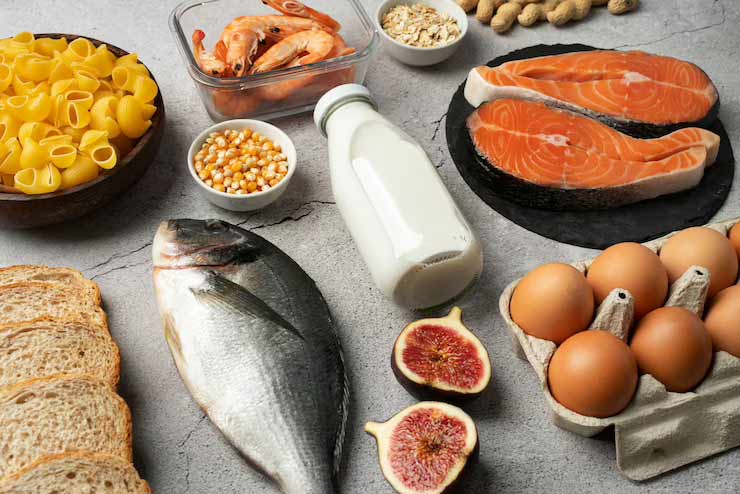
Some examples of lean proteins include:
- Poultry: Chicken and turkey are excellent sources of lean protein. They are low in fat, high in protein, and can be prepared in a variety of ways.
- Seafood: Fish and other seafood are rich in protein, low in calories, and high in omega-3 fatty acids, which are essential for heart health.
- Legumes: Beans, lentils, and peas are an excellent source of plant-based protein. They are also high in fiber, which helps with digestion and weight management.
- Eggs: Eggs are a low-calorie, high-protein food that can be eaten in a variety of ways, such as scrambled, boiled, or poached.
- Dairy: Low-fat dairy products, such as milk, yogurt, and cheese, are an excellent source of protein, calcium, and vitamin D.
The Benefits of Lean Proteins
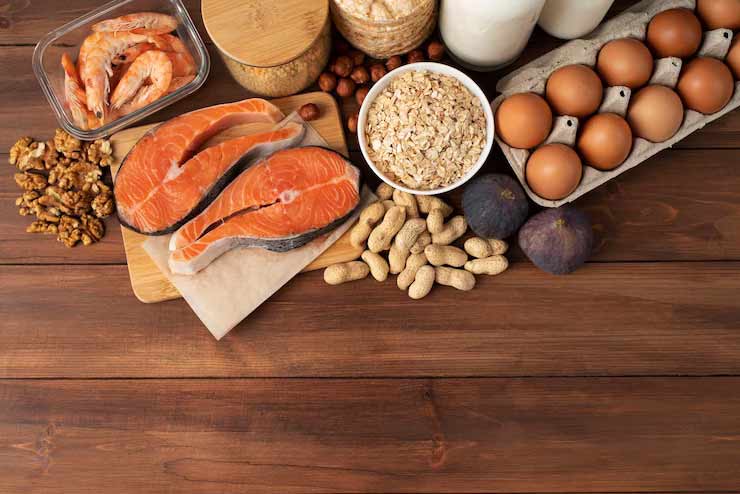
Weight Management
Lean proteins are an essential component of a healthy diet, especially for weight management. Protein is more filling than carbohydrates or fats, which means it can help you feel fuller for longer and reduce cravings. Additionally, high-protein diets have been shown to increase metabolism and promote fat loss.
Muscle Growth and Repair
Protein is essential for building and repairing muscles. When we exercise, we create tiny tears in our muscles that need to be repaired. Protein provides the building blocks necessary for this repair process. Additionally, consuming protein after exercise can help stimulate muscle growth.
Heart Health
Lean proteins can also benefit heart health. Research has shown that diets high in lean proteins, such as fish and poultry, can help reduce the risk of heart disease. This is because these proteins are low in saturated fat and high in omega-3 fatty acids, which have been shown to reduce inflammation and improve heart health.
Blood Sugar Control
Protein can also help regulate blood sugar levels. When we eat carbohydrates, our body breaks them down into glucose, which raises blood sugar levels. However, when we consume protein, it slows down the absorption of glucose, which can help regulate blood sugar levels.
Nutrient Dense
Lean proteins are also nutrient-dense, meaning they are high in essential nutrients such as vitamins, minerals, and amino acids. These nutrients are essential for maintaining good health and preventing chronic diseases.
How to Incorporate Lean Proteins into Your Diet
Incorporating lean proteins into your diet can be simple and delicious. Here are some tips on how to add more lean proteins to your meals:
Start with Breakfast
Starting your day with a high-protein breakfast can help you feel fuller for longer and reduce cravings throughout the day. Try adding eggs or Greek yogurt to your morning routine.
Pack Protein Snacks
Having protein-rich snacks on hand can help you avoid reaching for unhealthy snacks. Try packing some nuts, edamame, or hummus with veggies to snack on throughout the day.
Substitute Lean Proteins in Recipes
Substituting lean proteins in your favorite recipes can make them healthier and more nutritious. For example, swap
out high-fat ground beef for ground turkey in a spaghetti sauce recipe, or use beans instead of meat in a chili recipe.
Experiment with Seafood
Seafood is an excellent source of lean protein and can be prepared in a variety of ways. Try grilling salmon or tuna, or make a shrimp stir-fry with plenty of vegetables.
Choose Lean Cuts of Meat
When choosing meat, opt for lean cuts such as chicken breast, turkey breast, or pork tenderloin. These cuts are lower in fat and calories than other cuts of meat.
Incorporate Legumes
Legumes, such as beans and lentils, are an excellent source of plant-based protein. Try adding black beans to a salad, or make a lentil soup for a nutritious and filling meal.
Try Vegetarian Options
Vegetarian options, such as tofu or tempeh, are a great source of protein for those who follow a plant-based diet. Try adding them to stir-fries or salads for a protein-packed meal.
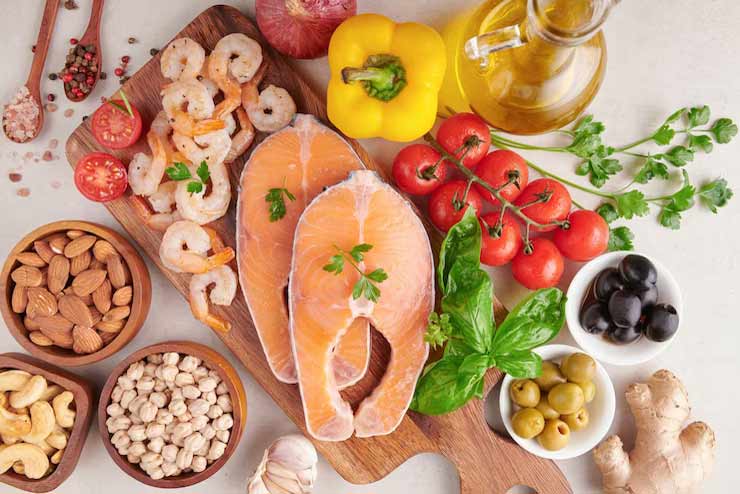
In conclusion, lean proteins are an essential component of a healthy diet. They provide numerous health benefits, including weight management, muscle growth and repair, heart health, blood sugar control, and essential nutrients. Incorporating lean proteins into your diet can be simple and delicious, and can help you achieve your health and fitness goals. By making simple substitutions and trying new recipes, you can enjoy a wide variety of nutritious and protein-rich foods that will support your overall health and well-being.
Additionally, the consumption of lean proteins has been linked to a lower risk of chronic diseases such as type 2 diabetes, heart disease, and certain types of cancer. Studies have shown that consuming a diet high in lean proteins can lead to a decrease in blood pressure, cholesterol levels, and inflammation in the body. These factors are all significant risk factors for chronic diseases, making lean proteins an important part of a disease-preventing diet.
One of the significant benefits of incorporating lean proteins into your diet is weight management. Protein is known to be more filling than carbohydrates or fats, which means that it can help you feel fuller for longer, reducing your overall calorie intake.
Moreover, a diet high in lean proteins has been found to promote fat loss, increase metabolism, and preserve muscle mass, which is essential for healthy weight management. In addition, consuming lean proteins can help you maintain a healthy weight and reduce the risk of obesity and its associated health problems, such as heart disease, diabetes, and certain types of cancer.
When choosing lean proteins, it’s essential to pay attention to portion sizes and preparation methods. While lean proteins are nutritious and low in calories, consuming them in excess or cooking them in high-fat methods can lead to weight gain and other health problems. To ensure that you are getting the most significant health benefits from lean proteins, aim to consume them in their natural state, avoid deep-frying, and use healthy cooking methods such as grilling or baking.
Another crucial factor to consider when consuming lean proteins is the quality of the protein source. While all proteins are made up of amino acids, not all protein sources are created equal. Plant-based proteins, such as legumes and nuts, are a good source of protein but may not provide all the essential amino acids needed by the body.
Animal-based proteins, such as lean meats and seafood, provide all the essential amino acids required by the body, making them a complete protein source. It’s essential to include a variety of protein sources in your diet to ensure that you are getting all the essential amino acids that your body needs.
Incorporating lean proteins into your diet can be easy and delicious. Many lean proteins, such as chicken breast, fish, and legumes, are easy to prepare and can be used in a variety of recipes. For example, grilled chicken breast can be served with a side of roasted vegetables for a healthy and nutritious meal. Similarly, salmon can be baked with herbs and served with a side of quinoa or brown rice for a delicious and protein-packed meal.
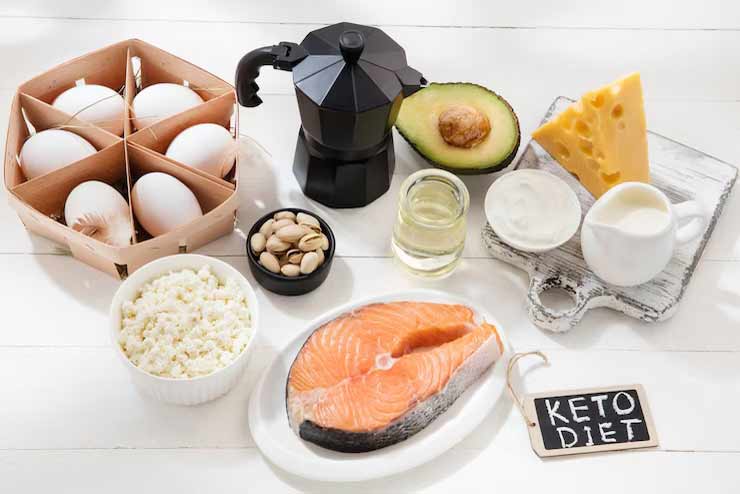
In conclusion, lean proteins are an essential part of a healthy diet and play a critical role in supporting overall health and well-being. They provide numerous benefits, including weight management, muscle growth and repair, heart health, blood sugar control, and essential nutrients. By incorporating lean proteins into your diet, you can improve your overall health and reduce the risk of chronic diseases.
Remember to choose quality protein sources and pay attention to portion sizes and preparation methods to ensure that you are getting the most significant health benefits from lean proteins. With a little creativity and experimentation, you can enjoy a wide variety of delicious and nutritious protein-rich foods that will support your health and well-being.
One way to incorporate lean proteins into your diet is by making smart choices when eating out. Many restaurants now offer healthy and protein-rich options on their menus. When dining out, look for lean protein options such as grilled chicken, fish, or tofu, and ask for steamed vegetables as a side. Avoid high-fat menu items such as fried chicken, hamburgers, and creamy sauces, which can add unnecessary calories and saturated fat to your diet.
If you are following a vegetarian or vegan diet, it’s essential to pay attention to your protein intake to ensure that you are getting all the essential amino acids your body needs. Plant-based protein sources such as legumes, nuts, and tofu can provide a good source of protein, but it’s important to include a variety of protein sources to ensure that you are getting all the essential amino acids your body needs. For example, combining legumes with grains such as brown rice or quinoa can provide a complete protein source. Vegetarian options such as veggie burgers, tofu stir-fries, and lentil soups can also provide a delicious and protein-packed meal.
It’s also important to note that some lean proteins can be more expensive than others. For example, fresh seafood can be costly compared to other protein sources. However, there are ways to incorporate lean proteins into your diet without breaking the bank. Buying frozen fish or chicken in bulk can be a more affordable option, and canned fish such as tuna and salmon can also provide a convenient and protein-rich option. Additionally, incorporating plant-based protein sources such as legumes and nuts can be a more cost-effective way to add protein to your diet.
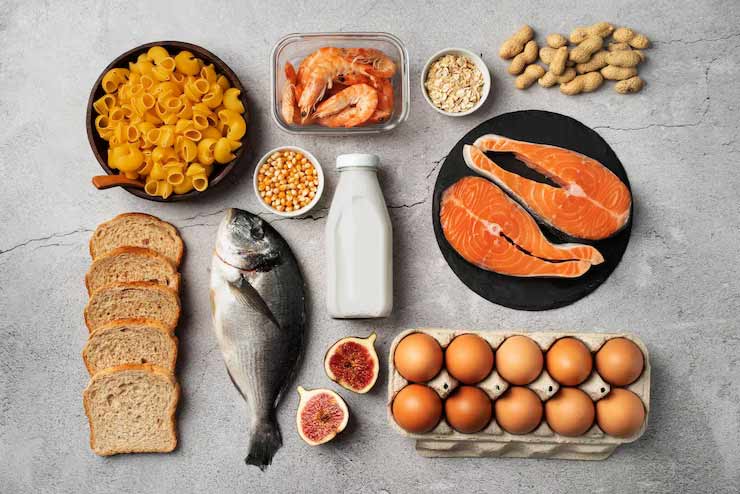
In summary, incorporating lean proteins into your diet is a crucial component of a healthy and balanced diet. Lean proteins provide numerous health benefits, including weight management, muscle growth and repair, heart health, blood sugar control, and essential nutrients. By making simple substitutions, trying new recipes, and making smart choices when eating out, you can enjoy a wide variety of nutritious and protein-rich foods that will support your health and well-being.
Remember to choose quality protein sources, pay attention to portion sizes and preparation methods, and include a variety of protein sources in your diet to ensure that you are getting all the essential amino acids your body needs. With a little creativity and experimentation, you can enjoy a wide variety of delicious and nutritious protein-rich foods that will support your overall health and well-being.
Some examples of lean protein sources that you can incorporate into your diet
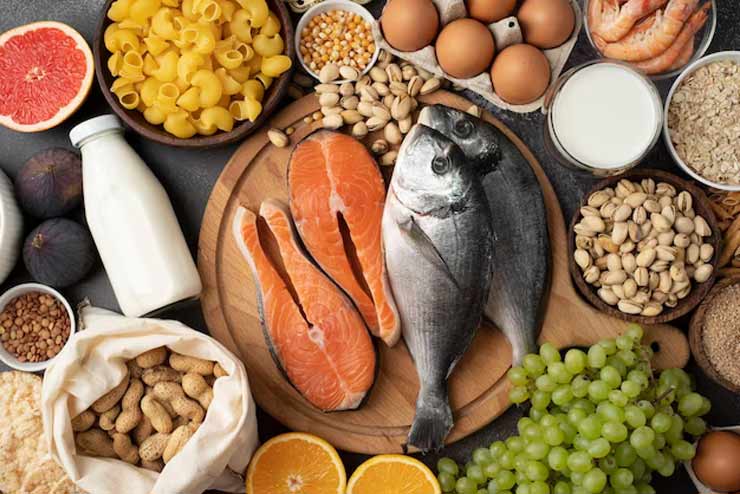
- Chicken Breast: Chicken breast is an excellent source of lean protein, with 31 grams of protein per 100 grams. It’s also low in calories, with only 165 calories per 100 grams.
- Fish: Fish is another excellent source of lean protein. Salmon, for example, has 25 grams of protein per 100 grams and is rich in omega-3 fatty acids, which can help reduce inflammation and lower the risk of heart disease.
- Turkey Breast: Turkey breast is another lean protein source that’s low in calories and high in protein, with 29 grams of protein per 100 grams.
- Legumes: Legumes, such as lentils, black beans, and chickpeas, are an excellent plant-based source of protein. They are also high in fiber, which can help you feel fuller for longer.
- Tofu: Tofu is a soy-based protein source that is low in calories and high in protein, with 8 grams of protein per 100 grams. It’s also a good source of calcium and iron.
- Greek Yogurt: Greek yogurt is a dairy-based protein source that’s low in calories and high in protein, with 10 grams of protein per 100 grams. It’s also a good source of calcium and probiotics.
- Quinoa: Quinoa is a grain that’s a good source of plant-based protein, with 8 grams of protein per cup. It’s also high in fiber and other nutrients, making it a healthy addition to any diet.
- Nuts: Nuts, such as almonds, peanuts, and cashews, are a good source of protein and healthy fats. They are also high in fiber and other essential nutrients.
- Eggs: Eggs are a low-calorie source of protein, with 6 grams of protein per egg. They are also a good source of essential vitamins and minerals.
- Lean Beef: Lean beef, such as sirloin or round, is a good source of protein, with 26 grams of protein per 100 grams. It’s also a good source of iron and other essential nutrients.
In conclusion, lean proteins are an essential component of a healthy and balanced diet. They provide numerous health benefits, including weight management, muscle growth and repair, heart health, blood sugar control, and essential nutrients. By making simple substitutions, trying new recipes, and making smart choices when eating out, you can enjoy a wide variety of nutritious and protein-rich foods that will support your health and well-being.
Remember to choose quality protein sources, pay attention to portion sizes and preparation methods, and include a variety of protein sources in your diet to ensure that you are getting all the essential amino acids your body needs. With a little creativity and experimentation, you can enjoy a wide variety of delicious and nutritious protein-rich foods that will support your overall health and well-being.
One of the benefits of incorporating lean proteins into your diet is that they can help with weight management. Eating a diet that is high in protein can help you feel fuller for longer, which can reduce your overall calorie intake and help with weight loss. Additionally, protein requires more energy to digest than carbohydrates or fats, which can boost your metabolism and help you burn more calories throughout the day.
Lean proteins are also important for muscle growth and repair. When you exercise, you create small tears in your muscle fibers, which then repair and grow stronger during the recovery process. Consuming protein after exercise can help facilitate this process and promote muscle growth and repair. In fact, research suggests that consuming protein after exercise can enhance muscle protein synthesis, which is the process by which your body builds new muscle tissue.
Another benefit of consuming lean proteins is that they can help improve heart health. Eating a diet that is high in protein has been associated with a reduced risk of heart disease. This may be due in part to the fact that protein can help lower blood pressure and improve cholesterol levels.
Consuming lean proteins can also help with blood sugar control. Protein can help slow the absorption of carbohydrates, which can help prevent spikes in blood sugar levels. Additionally, research suggests that eating a diet that is high in protein can improve insulin sensitivity, which is the body’s ability to use insulin to control blood sugar levels.
Finally, lean proteins are an important source of essential nutrients, including vitamins and minerals. For example, lean meats are a good source of iron, which is important for the production of red blood cells. Fish is a good source of omega-3 fatty acids, which are important for brain health and may help reduce inflammation in the body. And dairy products are a good source of calcium, which is important for bone health.
Incorporating lean proteins into your diet can be a challenge, especially if you are used to eating a diet that is high in carbohydrates or fats. However, there are many ways to make it easier.
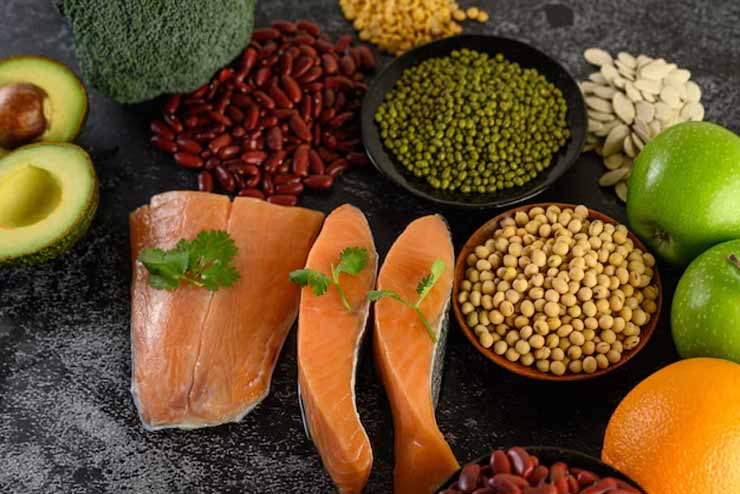
Here are some tips for incorporating lean proteins into your diet:
- Plan ahead. If you know that you are going to be busy during the week, take some time to plan out your meals in advance. This will help you ensure that you have lean protein sources on hand and will make it easier to stick to your healthy eating goals.
- Make simple substitutions. Instead of choosing high-fat cuts of meat, opt for leaner options such as chicken breast or turkey. Instead of using full-fat dairy products, choose low-fat or fat-free options.
- Experiment with new recipes. There are many delicious recipes out there that feature lean protein sources. Try new recipes to keep things interesting and avoid getting bored with your meals.
- Pack protein-rich snacks. Having protein-rich snacks on hand can help you stay full and satisfied throughout the day. Some good options include hard-boiled eggs, Greek yogurt, and nuts.
- Make smart choices when eating out. Many restaurants now offer healthy and protein-rich options on their menus. When dining out, look for lean protein options such as grilled chicken, fish, or tofu, and ask for steamed vegetables as a side.
- Be mindful of portion sizes. Even healthy foods can contribute to weight gain if you eat too much of them. Be mindful of portion sizes and try to eat slowly and mindfully to avoid overeating.
In conclusion, lean proteins are an important component of a healthy and balanced diet. They provide numerous health benefits, including weight management, muscle growth and repair, heart health, blood sugar control, and essential nutrients. By making simple substitutions, trying new recipes, and making smart choices when eating out, you can enjoy a wide variety of nutritious and protein-rich foods that will support your health and well-being. Remember to choose quality protein sources
The last word is with you, the audience
Be sure to read other educational articles. For scientific issues, be sure to contact a specialist doctor. These materials are only for study and non-educational purposes. Of course, expert doctors can guide you a lot.

Our cooking training center has collected unique materials for you dear ones. This content is very useful and will help you cook the best and most delicious food for yourself and your loved ones at home.
The recipe section is for introducing the best dishes of the nations. Dear ones, you can see the best dishes in this section and cook whatever you want at home. Don’t forget to read the recipe and ingredients before doing anything to determine your cooking needs.
Soon we will be with you with a more professional team with more facilities. We suggest that if you are overweight, fill out the and wait for our experts to contact you and send you the right meal plan.
The slogan we put on our site is to fight obesity. In this regard, we will provide you with many suitable recipes. Be sure to follow our site to learn about many healthy foods. Do not forget that a healthy life requires extensive changes. One of these changes is changing food. So eat healthy
Please follow us on linkedin. You can learn all best french food recipe and best Italian food recipe and best arabic food recipes and best Iranian food recipes you can check our Reddit page.
